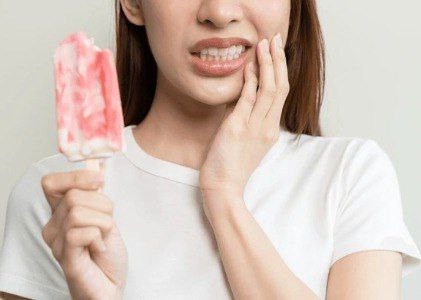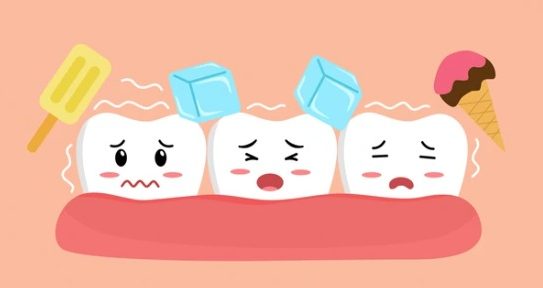Sachar Dental NYC
For SAME day / emergency appointments
Call (212) 752-1163
All the below content has been written by NYC Dentist, Dr. Sandip Sachar.
Why Are My Teeth So Sensitive?
If you’ve ever winced while sipping a hot coffee or felt a sharp jolt of discomfort when biting into ice cream, you’re not alone. Tooth sensitivity is a widespread issue that affects many people. But what exactly causes this zinging pain, and what can you do about it?
At Sachar Dental NYC, we see patients every week asking the same question: “Why are my teeth so sensitive?” Below, we’ll explore the real reasons behind sensitive teeth, how it can be managed, and when it’s time to book an appointment with your dentist.

What Is Tooth Sensitivity?
- Hot or cold foods and drinks
- Sweet or acidic foods
- Cold air
- Brushing or flossing

The Anatomy of Sensitivity: What’s Really Happening?
Common Causes of Tooth Sensitivity
- Enamel Erosion
Aggressive brushing, particularly with a hard-bristled toothbrush or abrasive toothpaste, can wear down enamel. So can diets high in acidic foods and drinks like citrus fruits, wine, and soda. - Gum Recession
When gum tissue pulls away from the tooth—often due to gum disease or aggressive brushing—it exposes the root, which lacks protective enamel. This is especially common in adults over 40. - Tooth Decay or Cavities
Cavities can cause localized sensitivity as decay erodes enamel and reaches the dentin. Small cavities may go unnoticed until the tooth becomes sensitive. - Cracked or Chipped Teeth
Even microscopic cracks can allow temperature changes and food particles to stimulate the nerves inside your tooth. - Bruxism (Teeth Grinding)
Grinding or clenching teeth, often due to stress or poor alignment, can wear down enamel and inflame nerves, especially at night. Many patients don’t realize they grind their teeth until they experience jaw soreness or tooth sensitivity. - Recent Dental Procedures
Teeth may be temporarily sensitive after procedures such as whitening, fillings, or crown placements. This typically resolves within a few days or weeks. - Acid Reflux or GERD
Stomach acids that reach the mouth can erode enamel over time. For patients with chronic reflux, dental erosion may be an early warning sign.
How Sensitive Is Too Sensitive?
If you experience sensitivity once and it’s mild and it goes away on its own to never return again, it may not be cause for concern. But if the discomfort is repetitive, persistent, severe, or localized to one tooth, it’s essential to get it checked out. It could be a sign of an underlying issue like decay, a fracture, or a failing dental restoration.
Diagnosis: What to Expect at Your Dental Visit
- A visual exam to check for gum recession, worn enamel, or cracks
- X-rays to detect decay or abscesses
- A bite test to identify teeth under excessive pressure
- Cold or air tests to isolate the sensitive tooth
Treatment Options for Sensitive Teeth
- Desensitizing Toothpaste
These contain ingredients like potassium nitrate or stannous fluoride that block pain signals from reaching the nerve. - Fluoride Treatments
In-office fluoride applications can strengthen enamel and reduce sensitivity, especially for patients with mild erosion or exposed dentin. - Dental Bonding or Sealants
For more severe cases, we may apply a bonding agent to cover exposed dentin or root surfaces, acting as a protective barrier. - Gum Grafts
If gum recession is the culprit, a surgical graft can restore lost tissue and reduce sensitivity long-term. - Mouthguards for Bruxism
Custom nightguards can protect your teeth if grinding is causing the problem. We custom fit these at Sachar Dental NYC to ensure both comfort and effectiveness. - Filling or Crown
If the sensitive is due to a cavity, a filling or crown may be necessary depending on the extent of the cavity. - Root Canal Therapy
When sensitivity is due to deep infection or irreversible nerve damage, a root canal may be the best (and only) way to resolve the issue permanently.
Prevention Tips
- Brush gently with a soft-bristled toothbrush
- Use fluoride toothpaste that is not too abrasive
- Limit acidic foods and drinks, or rinse your mouth afterward
- Don’t brush immediately after consuming acidic foods—wait at least 15 minutes
- Address grinding or clenching with a nightguard
- Treat any cavities or fractured teeth
- Keep up with routine cleanings and exams every six months
In NYC, life moves fast—but your oral health should never take a back seat.
When to Call a Professional
Book Your Consultation Today
Contact Sachar Dental NYC today to schedule your appointment. We are conveniently located in Midtown Manhattan, New York City.
Read MORE about TMJ (Temporomandibular Joint Disorder) on our services page.
Sensitive Teeth: Causes, Remedies & Treatments Available
Sachar Dental NYC
20 East 46th Street
Rm 1301
(Between 5th Ave & Madison Ave)
New York, NY 10017
212-752-1163
https://www.sachardental.com/
drsachar@sachardental.com